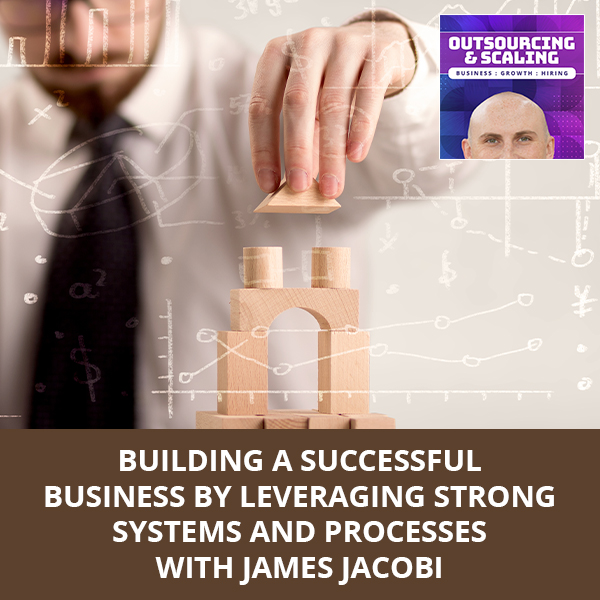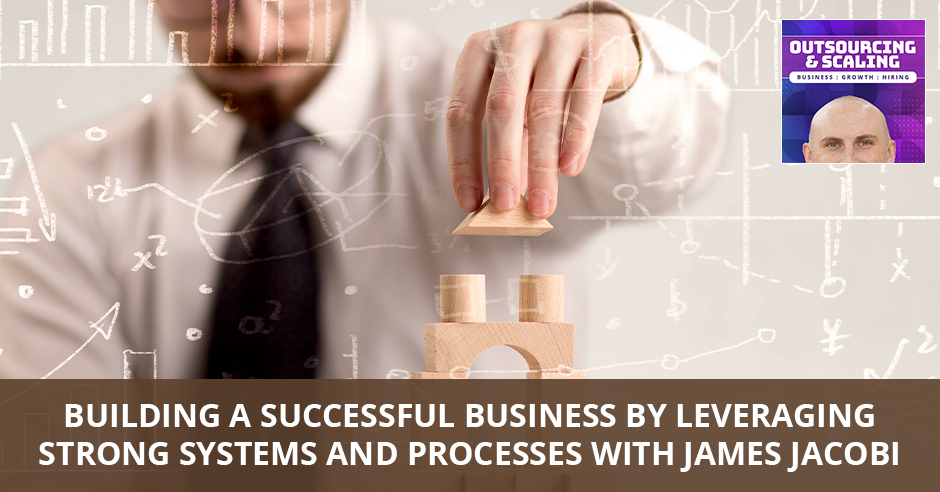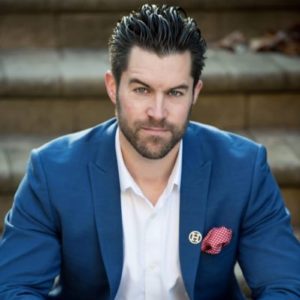


Your business can get pretty big without having good systems and processes, but you can only go so far. Business strategist and executive advisor James Jacobi, the Founder and President of Jacobi Enterprises and the author of the bestselling book Radical Integrity: 7 Breakthrough Strategies on Transforming Your Business, Sales and Life, joins us today to talk about business growth and how you can achieve that through leveraging strong systems and processes. That includes hiring people and structuring a strong sales and marketing team. He also gets down on the mistakes most business owners make as they’re trying to scale up.
—
Listen to the podcast here:
[smart_track_player url=”https://www.podetize.com/statsapi/www.podetize.com/wp-content/uploads/fileuploads/11-5b145ef137b51b3d1af0633e9305c43d/08/2019/edd927733bea94795b94f7f128c350e9.mp3″ title=”Building A Successful Business By Leveraging Strong Systems And Processes with James Jacobi” image=”https://freeup.net/wp-content/uploads/2019/04/OAS.png” ]
Download the audio file here.
Building A Successful Business By Leveraging Strong Systems And Processes with James Jacobi
I’m here with James Jacobi. James, how are you doing?
I’m good. Thanks for having me on, Nathan.
For those of you who don’t know, James is the Founder and President of Jacobi Enterprises, Cofounder of Ardor Learning and Creator of Morris Growth Con. He is the author of the bestselling book, Radical Integrity: 7 Breakthrough Strategies for Transforming Your Business, Sales, and Life. As a business strategist and executive adviser, James helps companies achieve accelerated revenue growth towards becoming an eight or nine-figure enterprise. He does this by helping them upscale their value, credibility, and positioning in the marketplace. James, I’m excited to talk to you. I want to talk all about growth and building businesses. First, let’s take a gigantic step back. I want to hear what you were like growing up. Were you a straight-A student? Were you a rebel? Did you always know that you wanted to be an entrepreneur?
My family has got entrepreneurs and corporate executives in it. I got a mix of both. I got the taste both. Now I taste both. I was in corporate myself for ten years and now I’m on the entrepreneur side of it. I grew up in a Midwest family. I and my brother and my dad worked for a corporate company for a newspaper business for 35 years. I got to see what that looks like. Back in the ‘70s and ’80s, a lot of us had that mindset where that’s what you do. You get a job and you grow in that job for 30 or 40 years and that’s it. That’s the plan. That’s the mindset that I grew up with. I did have some entrepreneurial tendencies. I didn’t know it until later in life. Even when I was six or seven, I was making door–to–door sales with the Scholastic newspaper or magazine we had in school. The contest was if you could sell the most Scholastic magazines, you would get a free limo ride to Hardee’s. I was like, “Let’s do this.“ I took my dad door–to–door and we crushed it. We won. It‘s been in me for a long time.
What was your first real entrepreneurial endeavor?
It’s outside of ad hoc projects and stuff like that. When I was a kid, it was leaving corporate. It was saying, “I’m going to take a step out. I’m going to write a book. I’m going to launch a consulting company and put my skills that I’ve used, learned and spent a lot of time, energy, pain and all sorts of stuff to learn and figured it out to use.”
Leading by example means you lead from the front, not the back.
Talk to us about the book. What is it about? Where did the idea come up with? What was that process of writing your first book?
It’s crazy. We all have at least one book, probably a dozen that we can write about. How can you frame something up and get it done? Some people write books for years and they never get it done or published or anything. I found this mentor who promised that I could get this thing done in nine weeks. I’m like, “That sounds pretty cool.” I felt I had so much to share and tell, especially in these last couple of years of growing, transforming and becoming the entrepreneur I am now. I had a lot to share with the business world about leadership, sales and how to be successful in your life, raising kids and it’s all that stuff. I got my book done in nine weeks. I wrote in three days. You hear that sometimes from some authors they say, “I wrote my book in two or three days.“ I’m like, “That’s not possible.“ No, it is possible if you have the right framework you can crush it. I learned a system on how to write a book and I got it done. Now it’s published. It’s going to be in airports everywhere in 2020. My first paperback is coming out. It’s a printed copy.
What does being a leader mean to you? I got a lot of clients that I work with, they can be good managers. They can manage their business.
I’ve gone through the gamut with this. Some of the hardest knocks I’ve learned and some of the biggest lessons I’ve learned is that you don’t need a title to be a leader. You’re a leader before you are deemed a leader. If you get put in a leadership position, you’ve shown something that has leadership potential or qualities that you’ve already shown. Leadership to me is you lead by example and you lead from the front, not the back. If you expect someone to do something, you should be fully willing to do it yourself too. You should know what you’re talking about. You should have proven results of what you’re talking about so you can teach and lead people. The whole thing about leadership in anything, especially in entrepreneurship and the consulting world and all that, but with anything it’s all about teaching someone how to fish. If you can teach someone how to fish so they can fish for themselves, that is the perfect leadership model because your whole job is to help lead people and to help them advance themselves. It’s not about you at all. Some people think it is. They think it’s a stage for them. It’s the most humbling thing you could possibly do where it’s not about you or all. It’s about paving the way so people can walk through it and be successful.

You’ve worked with a lot of eight and nine–figure businesses. Where do they struggle the most when it comes to being a leader?
I can now say that I’ve literally worked from a startup all the way to a $200 million company and seeing the entire life cycle of a company and what that looks like. I’ve had $9 billion clients in corporate. I’ve seen the biggest companies. It’s the same thing. It doesn’t matter what level of your business or cycle it’s in, the same leadership challenges always surface. Part of it is learning how to take on those responsibilities. A lot of people are in management roles and leadership roles. Those terms can get confusing, mixed or crossed. It’s a lot about learning your time management. It’s a lot about emotional intelligence and EQ. That’s a huge part of leadership. You only learn that by doing. You can’t study it and be good at it. You got to make a lot of mistakes and learn from people. Hopefully, you learn faster than others because every mistake we make and leadership is costly. It can cost us money. It can cost us time. It can cost us people that we fire, let go or fail to train the right way, all sorts of stuff. Emotional intelligence, having a strong vision and being consistent are some of the biggest traits of a good leader and challenges leaders have that I’ve seen.
You’re working with a business. They’re growing. They’re big. You can get pretty big without having good systems and processes, but you can only go so far. I know part of what you do is helping people leverage strong systems and processes. Using the FreeeUp platform are all about systems and processes. Talk to us about that and how you go into a business. What are the first steps to getting someone to get organized when it comes to those systems?
It’s amazing to me, especially in the entrepreneurial world now, it’s even more eye-opening because I get more time to take a deeper dive with clients. There are many companies that have gone to six figures, seven figures or eight figures. When you look underneath the cover of the hood, look at the engine that they’re running on, it’s like, “You got this far with that?” It’s impressive. A lot of it is passion and grit. They had a dream. They built it. They did whatever they could to make it work. It may not have been the most effective way, but I find a lot of people lack systems. That is one of the biggest things holding them back is you have to have a good system. The only way you can learn how to do that is we got to dissect your whole business.
The whole point of running a business successfully is if you can have it run without you even being there.
That’s why in the first encounter with my clients is we dissect the whole business. You look at all their assets and we say, “What are we looking at here? What do you want it to look like? What does it look like right now?” Often, almost all the time, it’s been two different stories. “I want to be this, but I’m on this now.” I’m like, “Let’s figure out how we can get to be this by maybe restructuring things you’re doing and be more efficient, have maybe some better systems in place to scale, to make more revenue for your products to perform better, your services to perform better, for your marketing and your messaging to be better that resonates with your target market better.” There are all these things that business owners don’t have time to think about all of it. You’re busy. You’re focused on one thing or a couple of things. You don’t have time to look in your blind spots and we help people look in their blind spots. We’d be like, “You are missing huge opportunity over here. We need to open your eyes up a little bit wider to see this. We’re going to frame this up and make something of it.”
What else do you see in terms of scaling that business owners are struggling with to get past the six and seven figures to the eight and nine figures?
Once you get through the hump of the first million or so or a couple million, your life cycle starts to change as a CEO and as a business owner. Instead of you selling most of the business and growing it out of a sheer will, it turns into a game of people and systems. You have to have that leadership as we talked about. You have to be able to teach and pass down the skillsets that are required to build this business and keep it going. The whole point of running a business successfully is if you can have it run without you even being there, that’s the game. That’s the level that you want to get to with your team. You want to be able to train everyone and have them in a place where you put in the right staff, the right leadership, you’re out as the business owner and it runs on its own. If you do a good job, it’s going to run better than when you did it.
That’s a game of learning your people. It’s learning how to hire and train correctly. It’s learning what systems work and it takes a lot of time to figure that out. The better, the quicker you can figure out, the faster you scale. I find too, as you grow seven to nine figures, the risk becomes higher. I see a lot of people become more risk-averse than when they were at the beginning. You have to be careful with that because if you become too risk-averse, you’re losing a huge opportunity for gains in your business. You have to balance that out as a business owner. That’s easier said than done.
You’re talking about hiring and building good teams. How do you help people hire better? What do you look for when you’re hiring people? Walk us through that process for a bigger business.
If you were to take the simplest form of hiring, there are a lot of great protocols or methodologies out there. You want to learn about someone’s past behaviors. You don’t want to be surprised on the first day or the first week of the first month of who this person is. You should have a pretty good understudy of who they are before they walk in their door. I’m going to give a couple of different ways to do this that I’ve used and I’ve also seen from various successful people that might help your audience out. One of them is if you’re looking at their resume, instead of having you dig through it all and try to figure things out, let them paint the story.

They should be a storyteller of themselves like, “Tell me what you did here. Tell me about your biggest accomplishment. Tell me about your biggest challenge.” As you’re hearing and listening, you’re listening for the values of your company. If you hire off values and you listen for integrity, hard work, teamwork, whatever your values are and you’re listening for those in those answers, you’re not telling them to tell you examples because there’ll be the cheat sheet. You want them to naturally show that they have those same values as you do and that will tell you that we’re on the right track. The other thing is painting extremely clear expectations in the interview, not when you hire them.
Get that done in the interview and say, “Here is what I’m expecting for this person to do. This is the function of the job and here’s how you will know if you’re doing a great job. Here’s how you will know if you’re doing okay. Here’s how you’re failing.” You frame it out before you hire them. It gives a great back and forth conversation of like, “Am I the candidate feeling comfortable with this or not?” We can have a candid conversation. If you can have a candid conversation with brutal honesty and you both are like, “This is a win-win,“ odds are you’re going to probably bring the right person on your team to do that. Are you going to be batting a thousand? No one bats a thousand. There are all sorts of reasons why it doesn’t work. Part of it is the person. Part of it is you. Part of it is the training. Part of it is whatever else, life’s external circumstances. Those are some things that I’ve learned and seen from others that had been helpful.
What about sales and marketing for a big business? I feel like that’s where it sometimes gets away from you. What works when you’re smaller doesn’t necessarily work well when you get bigger. How do you go about structuring a strong sales and marketing team?
I’d say yes and no to that. Maybe at first you do it all but as you get bigger, you may be structured more, but you still have the same operations in total. Maybe your managers or directors or VPs are doing some of the higher-level decision–making for what the business is supposed to do. Your staff is executing what’s more simple tactics and tasks. I’m working with a company where we have 50 salespeople. We‘re literally doing in-depth sales training 101 with their staff level. The executive level is making decisions on strategy of like, “Where are we going after business? What makes sense? What doesn’t make sense? What is the right customer for us? What is not? Where are we making profits? Where should we focus our business? Where are we losing a ton of money? Where are we still selling? Should we think that business?” Those are executive-level decisions that are being made. Some companies let the staff level be involved in that, but some don’t. It depends on how comfortable you are. I don’t think it changes too much when you scale. It changes the way it’s done internally.
People need room to be creative.
What other mistakes do you see business owners make as they’re trying to scale up?
I see they don’t delegate very well.
How do you get someone in that mentality of delegation?
From everyone that I’ve seen, including myself, it’s been a brutal road of hard knocks to realize like, “I can’t do it all as a leader. I need to trust people more. I need to empower them because they want that.” That will make their engagement go higher if I empower them and give them some delegation to do things. If I set clear expectations, I’m a better manager and leader for it because I’m being more clear with my employees on what I expect, how to do it and then give them the room for figuring it out. People need room to be creative. You can’t expect someone to be a robot in the job. That’s not going to work. Delegation is huge. I see that as a major flaw from startup to a big company. It’s at every level.
James, it’s been great. Where can people find out more about you? What are you most excited about 2019? I know you have the book coming out. Tell people more about that, but also anything else that you’re excited about?
If you’re on Facebook, find me, @James.Jacobi. I’m on LinkedIn a ton. Find me on LinkedIn.com/in/jamesjacobi. If you want a free copy of my book, you can go to my website, JamesJacobi.com. There will be a little button up top for a free book, click on that link. You’ll get a free PDF copy that’s going to be in the bookstores and the airports.
I’m excited for you. I’ll definitely check out the book. Thanks for coming on.
Thanks so much, Nathan.
Important Links:
- Jacobi Enterprises
- Ardor Learning
- Morris Growth Con
- Radical Integrity: 7 Breakthrough Strategies for Transforming Your Business, Sales, and Life
- @James.Jacobi on Facebook
- LinkedIn.com/in/jamesjacobi
- JamesJacobi.com
About James Jacobi
 James Jacobi is the Founder and President of Jacobi Enterprises, co-Founder of Ardor Learning, and creator of Morris Growth Con. He is the author of the bestselling book Radical Integrity: 7 Breakthrough Strategies on Transforming Your Business, Sales and Life.
James Jacobi is the Founder and President of Jacobi Enterprises, co-Founder of Ardor Learning, and creator of Morris Growth Con. He is the author of the bestselling book Radical Integrity: 7 Breakthrough Strategies on Transforming Your Business, Sales and Life.
As a business strategist and executive advisor, James helps companies achieve accelerated revenue growth towards becoming an 8 or 9 figure enterprise. He does this through helping them upscale their value, credibility and positioning in their marketplace, transforming their sales and marketing strategy, and leveraging proven systems for sustainability and scale. Clients come to him who either want to enhance their salesforce and close more sales, to implement an accelerated growth model, or have his team manage and close business for them, creating a scaling revenue-share partnership.
In less than 9 months as an entrepreneur and using my skillset from corporate, I’ve become a best selling author in business and sales that will be in nationwide airports come 2020, launched two businesses that are scaling passed 6 figures, and created a new business conference brand that is impacting local communities.
